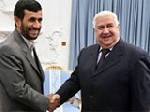 almotamar.net Google
almotamar.net Google - Iran’s president remained defiant today on the eve of a United Nations deadline for his country to stop enriching uranium, as tensions between Iran and the United States continued to mount in various ways.
President Mahmoud Ahmadinejad said his country will halt its uranium enrichment program, a prerequisite for building nuclear weapons, only if Western powers do the same. The U.N. Security Council has imposed limited sanctions on Iran, and has said it would consider further sanctions if the enrichment program is not stopped by tomorrow.
The United States Navy’s Fifth Fleet said today that another American aircraft carrier group arrived in the Sea of Oman south of Iran. The carrier, the U.S.S. John C. Stennis, and its accompanying strike group of ships joined the U.S.S. Dwight D. Eisenhower in a move widely interpreted as a warning to Tehran.
Even so, Robert Gates, the Defense Secretary, said, “We are not looking for excuse to go to war with Iran, we are not planning a war with Iran.”
Earlier this month, he said that the purpose of sending the Stennis “is simply to underscore to our friends, as well as to our potential adversaries in the region, that the United States has considered the Persian Gulf and that whole area and stability in that area to be a vital American national interest.”
For its part, the Iranian Navy in recent days has become more active in waters around the Persian Gulf where its vessels have not often been seen.
And Iran’s elite Revolutionary Guards staged a training exercise today, simulating an enemy air strike. The Guards land forces practiced fighting off the hypothetical enemy helicopters, planes and missiles with 620 antiaircraft cannon and shoulder-fired missiles, state television said.
News reports about contingency plans for a possible American military strike against Iran surfaced again today, this time from the B.B.C. A Pentagon official called the news report “ludicrous,” according to Agence France-Presse.
The United States has “significant concerns” about Iran’s nuclear programs and its meddling in Iraq, the agency quoted Bryan Whitman, a senior Pentagon spokesman, as saying. “But we’re addressing those issues on a diplomatic track.”
Mohamed ElBaradei, director general of the International Atomic Energy Agency, warned today that Iran appeared to have mastered crucial aspects of nuclear technology since August, and that the country could be as little as six months away from being able to enrich uranium on an industrial scale, according to The Financial Times.
Mr. ElBaradei said that Iran had now acquired important technical know-how from running its pilot nuclear program, and that there was no going back. “You cannot bomb knowledge,” he told the newspaper.
Even so, he was quoted as saying, American and British intelligence services estimate that Iran is still 5 to 10 years away from developing a workable nuclear bomb.
Mr. ElBaradei was scheduled to meet with Ali Larijani, Iran’s chief nuclear negotiator, today in a last-ditch effort to persuade Iran to change its path. Then, on Wednesday, Mr. ElBaradei is to issue a report on Iran’s compliance with the United Nations’ demands.
Iran’s nuclear program, however, may be delayed by Russia, which has said it will slow its work on Iran’s nearly completed Bushehr nuclear power plant because Iran has not made the last two $25 million monthly payments.
Mr. Ahmadinejad said today that Iran will not accept any preconditions for talks on its uranium enrichment program. But his speech was more conciliatory in tone than usual, avoiding fiery denunciations of the West and calling for talks.
“There is nothing wrong with suspension of Iran’s facilities where nuclear energy is produced, but our negotiators should also suspend their own nuclear fuel cycle to facilitate talks under equal conditions,” Mr. Ahmadinejad told a crowd in a speech in northern Iran, according to the state-controlled Islamic Republic News Agency.
The United States and several of its Western allies believe that Iran’s nuclear program is intended to produce an atomic weapon; Iran denies any such intention and says its aim is merely to generate electricity.
Uranium enriched to a low level is used in power plants; it must be enriched to a much higher degree to be suitable for building an atomic bomb.
The United States has also said that explosive devices used in Iraq that have killed at least 170 American and allied soldiers since June 2004 were made in Iran. The government in Tehran has denied the allegations.

